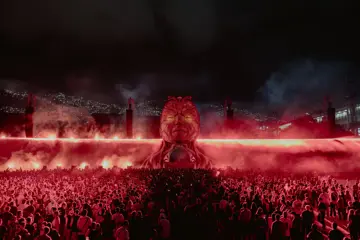The title of Julia Loktev's third feature, The Loneliest Planet, riffs, with some snark, on the publishing empire founded on the banks of the Maribyrnong. And, if you're going solely by titles, it also comes based on a short story title Expensive Trips Nowhere. Taken together, this almost paints the portrait of a satirical look at the extremes backpackers will go to in search of the untrodden path; its series of sci-fi landscapes, from Georgia's Caucasus Mountains, as far removed from the everyday reality of those sitting down to watch the film as the privileged-Western-urban lives most backpackers leave behind. But Loktev - an endlessly-thoughtful filmmaker whose one-face/one-camera, ticking-clock piece Day Night Day Night managed to transcend the easy sell of its 'female suicide-bomber!' synopsis - isn't interested, at all, in mocking those who venture off into the extremes of landscape. She's, instead, interested in how it feels to be there, removed not just from the daily grind but from familiar language, environment, culture; how it feels to be at the end of the Earth, and what it means to inhabit that space.
And The Loneliest Planet instantly makes it case as one of the greatest ever examples of 'cinematic phenomenology': in which watching a film makes you feel as if you are experiencing being in a place. For those who've voyaged extensively, perhaps no film has so perfectly captured that feeling of travel time; that feeling of the eternal unknown, that weird mixture of the mundane and the magical, the primal and the philosophical, the empty and the overwhelming, the uneasy and the joyous. Here, wee beefcake Gael García Bernal and Israeli actress Hani Furstenberg play a pair of young lovers who seek out a local Georgian guide (real-life mountaineer Bidzina Gujabidze) to lead them into the Caucasus. Born in Russia but raised in America's Rocky Mountains - and with a life of wandering, including through Central Asia, under her belt - Loktev is alive to the altitude, and the truths of tramping. Another filmmaker may've turned this three-hander into a talky theatre-piece, but Loktev respects the realities of the road: unending stretches of silence, time-killed by linguistic games (like endless conjugations of Spanish verbs), smalltalk falling by the wayside in the face of cultural/language barriers, reverent quiet almost the natural condition in face of such dwarfing environmental splendour.
And the environment Loktev and crew walk through is never anything less than astonishing. It's endlessly verdant, fecund, mossy, rich with growth, but there's not a tree in sight; the wild grasses and bursting tubers growing with gusto in the few months the landscape doesn't come buried under snow. There's an amazing, constant contrast between these deep greens and the wild red of Furstenberg's hair; green/red each carrying equal photographic weight, but always setting each other off; some of the film's most beautiful shots coming when Chilean cinematographer Inti Briones (whose long history in documentary is notable) catches the light coming through her hair; sun on tresses like flame on flame. Though there are many moments in which Loktev surveys, closely, the faces of her trio, she largely tends to place her figures as either tiny, isolated dots moving through the vastness, or frames them from behind, walking, in a gesture that will make some think of Béla Tarr, others first-person-shooters. There's a real rhythm, and a sense of philosophical density, to exactly where she positions each of the three; how she isolates them, or brings them together, how the endlessly-shifting power-structure of the group is told through the tiniest of gestures, or having two characters stand slightly closer together, or one more to the fore of the frame. Loktev studied architecture in her youth, came to cinema through sound design, and also makes video art, and you can see these influences at play in her work: every composition deftly considered; every piece of sound having the artfulness of field-recording, and contributing no small end to the film's transportive, taking-you-into-the-environment feeling.
In many ways, this feeling is the film. The Loneliest Planet does have an instant of climactic 'action' mid-film, but it's over in few seconds, and, initially, its purpose seems unclear. Loktev's first feature, a documentary called Moment Of Impact, gives a big clue: it was a portrait of how a split-second occurrence, in which her father was hit by a car, caused a rupture in her whole family's life, dividing everything into before/after. Here, our walking party crosses paths with suspicious local goat-herders who aren't used to trying to communicate in English, but are happy to use guns to do the talking. There's implicit political context in this - we are in Georgia, after all, site of recent warring and a long history of Russian oppression - but, instead, what's telling is how Bernal reacts, and what that means. The upshot is, essentially, that the equal independence - twin travellers brought together, walking side-by-side through any landscape - is revealed to be on uneasy footing; and that deep notions of gender, sex, and expectation thereof are roused. Loktev is one of those precious few filmmakers who, once the incident is over, is happy to let its reverberations be slight, be implied, be deep currents below the ripples on the surface; to, effectively, keep the audience on the 'outside', keep them guessing what is going on in these character's minds, guessing what they're feeling inside. The film doesn't build towards a big reveal, but, instead, loosely unravels, with a sense of inarticulate resentment building up in Furstenberg, creating the kind of tense, unspoken, uncomfortable hostility that rears up in situations like these; where the connection between a couple is momentarily severed, strained, or tested, but they're still stuck together. The Loneliest Place gracefully inhabits that space between them, too; simultaneously being about being in a landscape, and being in a relationship falling apart. Loktev artfully achieves the feeling of both spaces, both places; making this a film that will transport viewers unto the farthest-flung landscapes they've ever seen, yet, at once, lure them into dark places inside. It's a remarkable cinematic accomplishment that feels like nothing that's preceded it; a unique work whose grace and greatness can't be overstated.
No matter how populist a documentary, Hollywood reasoning goes, there's always going to be an audience who'll never see it due to its lack of Hollywood stars and three-act structure and dull musical cues. Thus, Promised Land arrives as, effectively, the fictionalising treatment of the boom in natural gas drilling; the obligatory 'fracking flick' for those in the cheap seats who haven't seen -nor maybe even heard of - Josh Fox's Gasland. Fox's film was an artful example of the personal-as-political - weighing up whether to lease his land to fossil-fuel prospectors, Fox toured places they'd already been, camera in tow, and found horror story after horror story - that resounded due to the essential human truths of its tale, and the righteous ire in its outrage. Here, that essential message is dulled with every compromised gesture; in how Matt Damon plays a gas-industry stooge undergoing a crisis-of-faith, how the screenplay sets up very silly dramatic double-crosses which dilute its own message, how fracking is depicted as being mostly bad only because Rosemarie DeWitt's potential-love-interest isn't into it. It's the romantic Hollywoodisation of the issue; a prestige-picture - Gus Van Sant behind the camera; John Krasinski, Frances McDormand, and Hal Holbrook roundin' out the cast - that doesn't even hit the unthrilling heights of your standard mediocre prestige picture. This is the opposite of the labyrinthine Traffic/Syriana/Michael Clayton/Fast Food Nation thriller, ditching the multi-tiered ensembledom for a simple Small Town American portrait that imagines itself to be Capra-esque, yet seems more offensive than that; environmental degradation the picturesque backdrop for a blithely breezy, dramatically mediocre rom-com of neither artistic nor political ambition.
Silence In The House Of God: Mea Maxima Culpa is a fine piece of micro/macro storytelling: a documentary on the boys at a Catholic School for the Deaf in Wisconsin who, in the late-'60s and early-'70s, suffered sexual abuse at the hands of the parish priest. Alex Gibney (Enron: The Smartest Guys In The Room; Taxi To The Dark Side; Gonzo: The Life And Work Of Dr. Hunter S. Thompson; etc.) makes this a determinedly personal story, with the to-camera confessions signed by survivors (and spoken, in voice-over 'translation', by Chris Cooper, John Slattery, and Jamey Sheridan, giving them the voices of dapper silver foxes, all) the heart of the film. But gradually Gibney pulls back, and shows how this single site of sexual abuse is symbolic of systemic oppression for which the entire Catholic Church is culpable. It's timely to watch, too, given the recurring presence of Cardinal Ratzinger, the erstwhile pope who recently became the first papal resignee in 600 years. Prior to his ascension - as he is often involved, here - he was intimately tied to so many of the cases of sex crimes that canonical practice sought to cover up at all costs. Thus, the silence of the title takes on so much layers: becoming the silence in a school for the death, the silence of victims, and, eventually, the silence that reigns as code-of-conduct in the Catholic church.
When Asghar Farhadi became the first-ever Iranian to win an Oscar, for A Separation in 2012, he became a huge figure both at home and abroad. Though Iran had long had an amazing national cinema - replete with a grandmaster, Abbas Kiarostami, and a royal family, the Makhmalbaf film house - nothing speaks to a vast global audience quite like that night of Gold Dildos. Now, Farhadi's next film, The Past (shot in France with Bérénice Bejo and Tahar Rahim, his first film made outside Iran), seems likely to debut at Cannes in 2013; and his overlooked back-catalogue is being eagerly explored. Farhadi's first five features are all currently in circulation at ACMI, in a program based around his prior picture, 2009's About Elly. Every bit as impressive as the critically-trumped flick that succeeded it, About Elly is another masterwork of tension, deception, the unknowability of the truth, and storytelling as an examination of a society. If A Separation felt as taut and claustrophobic as a thriller, here things are a little more thriller-ish: the director staging an uncomfortable crisis-of-morality that borders on Hitchcockian; a dinner-party-discussion of a film in which a simple incident tears away the politeness of society, allowing secrets and lies to rise to the surface like so many dead bodies.
This disquieting drama finds Farhadi dispatching a gang of middle-class, middle-aged friends - and their kids - to a cabin by the sea for a group holiday. At first it's all friendly teasing and attempts to set up Ahmad (Shahab Hosseini), back home visiting from Germany, with the available - and thus effective 'property' of all - Elly (Taraneh Alidoosti). When said titular lass disappears without trace, countless questions are raised: Who was she, really? Why was she here, really? What should we tell the police? And, most importantly, for the filmmaker: what secrets does each character hide? Farhadi happily offers no answers, instead allowing his characters to, in their impassioned debates and subtle bullyings, create a culture of fabrication. By deliberately keeping the audience in the dark, eliding narrative 'truths' from frame, Farhadi is, in many ways, paying tribute to that ultimate lie: cinema.
Yet, About Elly is not just a cinematic parlour-game, but a film of enlightened ideas. As our bourgeois characters lay their ideological foundations on a farrago of half- and mistruths, they're building lives on moral quicksand; the ensemble a collective noir-film protagonist, sinking slowly, surely into the mire. If About Elly were made by a Western filmmaker, it would be a parable on the emptiness of modern life, but Asghar is offering a sharp critique on Islamic law in Iran. Repressing basic liberties and sublimating all traces of desire, the stringent, anti-humanist social mores of this new Muslim conservatism, Asghar posits, essentially dictate that grown adults live lives as extended pantomimes; inconvenient truths and uncomfortable feelings buried behind a public façade of sexless devotion and righteous honour. Here, the impending involvement of the police terrifies because it threatens to upset the public pantomime. So instead of being what will set you free, ideologically, here the truth is a yoking burden; the kind of thing that can be used against you, keep you socially shackled. Thus, it becomes something that must be buried, at all costs; an eternal cinematic device made bracingly immediate and poignant.















